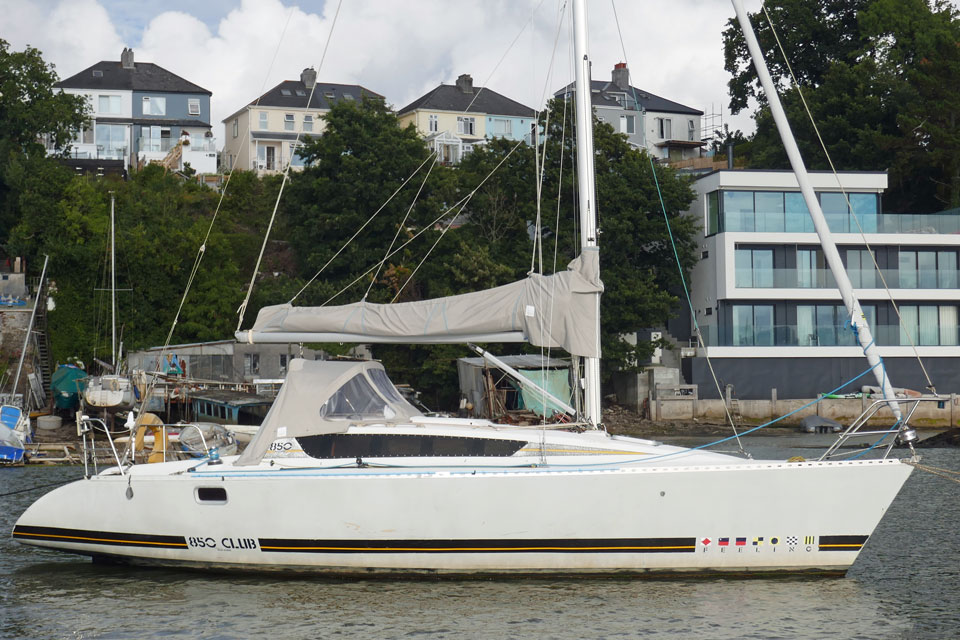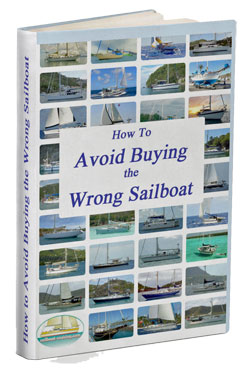- Home
- Cruising Yachts 30' to 35'
- Feeling 850
The Feeling 850 Sailboat
Specs & Key Performance Indicators
The Feeling 850 is a light-displacement cruiser-racer sailboat that was designed by Philippe Briand and built by Kirie in France. It is based on the prototype "Free Lance", which won the Half-ton cup in 1983.
 The Feeling 850 Sailboat
The Feeling 850 SailboatPublished Specification for the Feeling 850
Underwater Profile: Fin keel & spade rudder
Hull Material: GRP (Fibreglass)
Length Overall: 27'11" (8.5m)
Waterline Length: 24'5" (7.5m)
Beam: 10'6" (3.2m)
Draft: 5'7" (1.7m)
Rig Type: Masthead sloop
Displacement: 6,614lb (3,000kg)
Ballast: 2,205lb (1,000kg)
Designer: Philippe Briand
Builder: Kirie Association (France)
Year First Built: 1984
Year Last Built: 1988
Number Built: 313
Published Design Ratios for the Feeling 850
1. Sail Area/Displacement Ratio: 21.6
2. Ballast/Displacement Ratio: 33.3
3. Displacement/Length Ratio: 202
4. Comfort Ratio: 17.5
5. Capsize Screening Formula: 2.2
Summary Analysis of the Design Ratios for the Feeling 850
1. A Sail Area/Displacement Ratio of 21.6 suggests that, in the right hands, the Feeling 850 will have enough performance to leave most other sailboats of similar waterline length well astern.
2. A Ballast/Displacement Ratio of 33.3 means that a sailboat like the Feeling 850 (which doesn't have a stiffness-enhancing bulb keel), is likely to benefit from being reefed early to keep her sailing upright in a moderate breeze.
3. A Displacement/Length Ratio of 202, tells us the Feeling 850 is a moderate displacement cruiser, which means she'll carry all your cruising gear without it having a dramatic effect on her performance. Most of today's sailboats intended for offshore cruising fall into this displacement category.
4. Ted Brewer's Comfort Ratio of 17.5 suggests that the Feeling 850 will have the motion underway to that of a lightweight racing boat. Crew comfort will often be memorable for all the wrong reasons. Beating upwind in lively conditions the Feeling 850 will slam enough to shake your fillings out with a motion that most cruising sailors have no desire to get used to.
5. The Capsize Screening Formula of 2.2 tells us that a Feeling 850 would not be as good a choice of sailboat for ocean passage-making, owing to the increased risk of capsize in strong winds and heavy seas when compared to a sailboat with a CSF of less than 2.0.
Any Questions?
Is the Feeling 850 still in production and, if not, when did production end and how many of these sailboats were built?
Is the Feeling 850 still in production and, if not, when did production end and how many of these sailboats were built?
The Feeling 850 is not in production anymore. Production ended in 1988, after 313 hulls were completed.
What is the history of the builders of the Feeling 850 and is the company still in business?
What is the history of the builders of the Feeling 850 and is the company still in business?
The builders of the Feeling 850 were Kirie, a French company founded in 1927 by Louis Kirie. The company started as a wooden boat builder, then switched to fiberglass in the 1960s. Kirie produced many models of sailboats under the Feeling and Elite brands, as well as some powerboats. The company went bankrupt in 2015 and was taken over by another French boat builder, Dufour.
What sail plan and rigging options are available for the Feeling 850?
What sail plan and rigging options are available for the Feeling 850?
The Feeling 850 has a sloop rig with a single spreader mast. At least three different rigs were available: a masthead rig with an overlapping genoa, a fractional rig with a non-overlapping jib, and a fractional rig with an overlapping genoa. The sail area is about 44 m², with a mainsail of 14.4 m² and a foresail of 18.8 m².
What keel options are available for the Feeling 850?
What keel options are available for the Feeling 850?
The Feeling 850 has two keel options - a fin keel and a centreboard:
- The fin keel version has a draft of 5'7" (1.7m) and a ballast weight of 2,205lb (1,000kg);
- The centreboard version has a draft of 2'4" (0.7m) with the board up and 5'11" (1.8m) with the board down.
What is the Feeling 850 like to sail?
What is the Feeling 850 like to sail?
The Feeling 850 is a fun and responsive sailboat that can handle various wind conditions. It has a good hull speed of 7.8 knots, and a high sail area/displacement ratio of 21.5, which indicates high performance potential. The boat is easy to maneuver with tiller steering and lines led aft to the cockpit. The boat has a comfortable motion at sea, thanks to its moderate displacement/length ratio of 202.2 and its low comfort ratio of 17.4.
What is the average cost of a secondhand Feeling 850?
What is the average cost of a secondhand Feeling 850?
The average cost of a secondhand Feeling 850 depends on the condition, equipment, and location of the boat. Based on some online listings, the price range can vary from £10,000 to £20,000 ($12,900 to $25,800).
What other sailboats have been created by the designer of the Feeling 850?
What other sailboats have been created by the designer of the Feeling 850?
The designer of the Feeling 850 is Philippe Briand, a renowned French naval architect who has created many successful sailboats for racing and cruising. Some of his other designs include: Beneteau First series, Jeanneau Sun Odyssey series, Wauquiez Centurion series, CNB Bordeaux series, Lagoon catamarans, Oyster yachts, Perini Navi superyachts, and more.
The above answers were drafted by sailboat-cruising.com using GPT-4 (OpenAI’s large-scale language-generation model) as a research assistant to develop source material; to the best of our knowledge, we believe them to be accurate.
Recent Articles
-
Dufour 470 Review: Specs, Ratios & Expert Performance Analysis
Feb 12, 26 11:25 AM
An in-depth review of the Dufour 470 sailboat. Explore technical specifications, design ratios, and cruising characteristics of this versatile Umberto Felci design. -
Island Packet 40 Review: Specs, Performance & Cruising Analysis
Feb 09, 26 05:05 AM
An in-depth review of the Island Packet 40 sailboat. Explore technical specifications, design ratios, and real-world cruising performance for this legendary blue-water cruiser. -
Beneteau Oceanis 331 Clipper Review: Specs, Performance & Ratios
Feb 04, 26 07:25 PM
A comprehensive review of the Beneteau Oceanis 331 Clipper sailboat. We analyse design ratios, interior layout, and performance for prospective cruising owners.
